| News from 2008 |
| |
|
| Pocklington Families |
| 14th December 2008 |
|
A new section has been started on the website called 'Pocklington families' and Martin Cooper has written a profile on the Robson family of Pocklington. Thomas Robson served many offices in Pocklington at the turn of the century and his obvious contribution was the building of the Victoria Memorial in Market Street. Two other Robson's were amongst Martin's 'Fallen Heros' that he recently researched for the exhibition held in November. If you would like to submit a Pocklington Family page, then please contact me.
Further research on Pocklington Inns has produced extra information on the Three Horsehoes inn in Market Street. Using property records it has been possible to find out that the 'Horseshoes' inn was opened around 1750 by John and Mary Easton as a diversification for their Blacksmith business on the same site. It has been possible to trace the property back to 1686 when a property record describes "the town beck running before the door on the south".
The Buck has been taken back to at least 1769 when William Pinder applied for a licence (Alehouse recognizance). Pocklington New Inn was found to have been built just prior to 1759 by Thomas Overend, a Pocklington Brewer who wanted to capitalise on the Coaching trade that was bypassing Pocklington on the York-Hull road.
|
| |
| Pubs, Updates and Corrections |
| 7th December 2008 |
|
It has been discovered that 'The Station' Hotel used to be called 'The New Red Lion' Hotel and in the early nineteenth Century, for a brief period, was called the 'Dog and Duck'. 'The Red Lion' in Regent Street became known as 'The Old Red Lion'. One of Pocklington's oldest inns was the 'Star Inn' and dates from at least 1733. The 'Cross Keys' was so named after the nearby Manor House of the Dean of York. The story of the black cat of the 'Feathers' was updated and the list of landlords.
Coins and artefacts found in and around Pocklington are being recorded on the site. 'The Pocklington Axe' was from Neolithic times and is in Hull Museum. Auction catalogues provide a useful source of information and included from them are metal detector finds and World War II medals, The auction site Ebay is another source of discovered finds.
Pocklington's influence and development was largely due to the success of it's fairs and markets. Pocklington fair was attended by Dick Turpin the infamous highwayman. Pocklington National school was in New Street and built by Thomas Grant. John Singleton was the world's first professional jockey and was born in Melbourne in 1715.
|
| |
| Lords of the Manor & Updates |
| 23rd Nov 2008 |
|
|
|
Lords of the Manor - members evening |
'Fallen Heroes' exhibition |
On 13th November a members evening of talks on the Early Lords of Pocklington Manor took place. First was Earl Morcar, the last Saxon lord of Pocklington Manor, and was deeply involved with the momentous events in 1066 that decided the course of English history. Following his escapades came William's retribution on Yorkshire called 'the Harrying of the North'. A later Lord Thomas Bishop was involved in intrigue, was a spy, a traitor, an opportunist and a survivor. A most fascinating evening.
Two more Trade Directories; Kelly's 1929 and Kelly's 1933 have been added since the last update. Old streets of Pocklington have been created by the research of Roger Bellingham. Following the Fallen Heroes exhibition, the men who fell are recorded on the Pocklington War Memorial. Dr. Wilson found the 'Grimthorpe Sword' and was Pocklington's foremost archaeologist. The Forum has some fascinating Pocklington Family information including one Pocklington family tracing their family line back to Sir Thomas More who was beheaded in 1535 for not recognising Henry VIII as head of the Church.
|
| |
| David Neave Talk |
| 6th October 2008 |
|
|
|
David Neave gives his talk to Pocklington |
A good attendance at Burnby Hall |
Dr. David Neave came back to Pocklington 40 years after starting the first history classes at Woldgate School, which later led to the publication of the definitive reference on Pocklington called "Pocklington 1660-1914: A Small East Riding Market Town". David gave a most interesting talk on the development of the town from early times, included some previously unseen photographs and references which the history group will follow up and research.
|
| |
| 2008 Heritage Day |
| 13th September 2008 |
|
| On the 13th September, Pocklington held it's heritage day in the Old Court house in George Street and Pocklington Local History Group set up an exhibition of old photographs. A hot day provided a good attendance and many people appreciated the effort put into the display. Thanks is given to Yara Phosyn for printing many of the large photos and providing the display stands. One positive outcome was the naming of many faces on the group photographs and the addition of more photograph scans. Ones progressed include the coronation street party, and a further Woldgate school photograph from around 1975. Please let us know any names to the faces. |
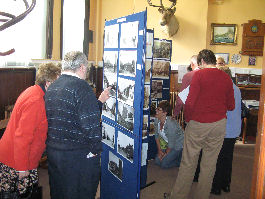 |
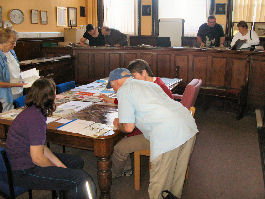 |
| Many more old Photos were on display. |
Research of old documents and newspapers |
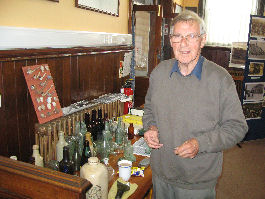 |
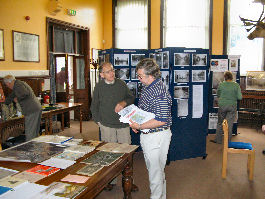 |
| Dennis Moor & his bottle collection |
Ian Gibbs & Phil Gilbank comparing notes |
| |
| More Directories |
| 25th August 2008 |
|
Two more Trade Directories of the town have been added. These are William White's 1858 Directory and the excellent Post Office Directory of 1879 which went on to become Kelly's Trade Directory. They cover a period previously lacking of information on this site.
Pocklington metal detector finds are a very useful insight into activity in various periods of history. We have been given permission from the Fitwilliam Museum in Cambridge to show items from their database for Pocklington on this website. They only record items from the period 410 - 1180, but the spread of coins found show that Pockington was an early market town. Roman coins are plentiful but are not recorded by the EMC database, a hoard was found near Pocklington.
Sport was very important in Pocklington, and we had an early Boxer prize fighter who fought in wager fights near Leeds. Pigeon shooting was a popular pastime and this occurred close to the town. Horse Racing on the New Inn track took place up to at least 1842, and is visible on the 1854 OS map.
|
| |
| Forum Released! |
| 9th August 2008 |
|
Thanks to my son, Daniel, PocklingtonHistory.com now has a Forum that anyone can join and post their questions, suggestions on any topics of research into the Local History of Pocklington or their Family History. If you are researching your links to any person, past or present, please post your information or question here. Someone will answer it. Daniel also has fixed the Menu problem that occurred with Internet Explorer 6.
Read about a hoard of Gold and Silver coins that were discovered in 1848 near the Railway Station. There was a dispute of ownership and the Police in London were involved!
George Boast, the Jockey, was born in Pocklington in 1786, he started racing on Pocklington's race track which went around the New Inn, and competed for a silver cup. I wonder what happened to the cup, was it inscribed?
The Forum was closed in June 2013 and removed in August 2013.
|
|
| |
| 1932 Floods |
| 19th July 2008 |
|
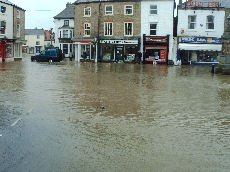 June 2007 saw the worst floods in living memory, but for older residents they remember the Great Floods of 1932 as being worse. The Howdenshire Chronicle and Pocklington Weekly News newspaper has an interesting report which ironically concludes in capital letters that we must 'DO SOMETHING TO PREVENT ANY FURTHER FLOODING'. June 2007 saw the worst floods in living memory, but for older residents they remember the Great Floods of 1932 as being worse. The Howdenshire Chronicle and Pocklington Weekly News newspaper has an interesting report which ironically concludes in capital letters that we must 'DO SOMETHING TO PREVENT ANY FURTHER FLOODING'.
Thanks to a recommendation by the Pocklington History Group, the new library is to be named after the first ever library built in memory of Dr. Thomas Wilson. Read about this interesting Pocklington Doctor.
Two surviving fragile old documents have been discovered in private hands. The Wesleyan Methodist Circuit for 1869 and for 1870 have been digitised to preserve them and can be viewed using the new zoom tool installed on to the website. Please contact the Group if you have similar old documents or fragile photographs which need preservation.
|
| |
| Heritage Walk |
| 7th July 2008 |
|
|
|
The author Phil Gilbank in 'Simply Books' |
A tour of the town |
'Simply Books' launched the new Pocklington & District Local History Group book called "A Pocklington History & Heritage Trail". To coincide with the launch and the town's book week, the history group organised a sell out walk and talk for 45 people. Various speakers were stationed at historic locations in the town and each gave a 10 minute talk. Everyone enjoyed the evening between the rain showers.
*STOP PRESS* - The story of a young telegraphist aboard HMS Volage is told by Australian Arthur W. Carter who has kindly submitted his story to this website. HMS Volage was adopted and sponsored by the town of Pocklington in the last war.
|
|
| |
| Maps! |
| 22nd June 2008 |
|
William Watson created two superb maps of Pocklington for which Local Historians of the town have been forever grateful. They provide a wealth of information on Pocklington over 150 years ago. The 1844 Map shows how Pocklington was before the arrival of the railway. The 1855 Map gives even more information by providing a visual representation of the houses as well as the main householders. For the first time his maps can be viewed using 21st Century technology (thanks Dan!).
A photograph has been sent to me of the Pocklington Home Guard. If you recognise anyone please let me know. Also, as an experiment, I include a Woldgate School Photo of 1968.
|
| New stuff |
| 15th June 2008 |
|
As the church pages were updated, I thought it time that the Chapel pages were updated. We now have pages for Pocklington Wesleyan Methodist Chapel, the Congregational Church and the Primitive Methodist Chapel. Simeon Templeman was an intersting character and more information about his family roots have been added. Read about Pocklington's last Duel in 1838 from a newspaper report at the time. No one was killed, but the outcome was a bloody nose.
One of the joys of running a website like this is that people submit articles from their research and local knowledge. Thanks to Ian Gibb for his article on the Everingham Brothers of Pocklington and their Bus service.
|
| |
| Updates |
| 1st June 2008 |
|
The church pages have been updated. Phil Gilbank found a fascinating letter to the Pocklington Weekly News about the Soteby Cross, expressing the opinion of the Antiquarian, Dr. Wilson, that Pocklington was the site of the conversion to Christianity of King Edwin in 627 following the destruction of the Pagan Temple at Goodmanham. It is commonly stated that Aldby, Buttercrambe was where this took place. If true, and his arguments seem persuasive, makes Pocklington an important centre for early Christanity. Dr. Wilson created Pocklington's first library which was called the 'Wilson Memorial Library', surely our Library should still be named as it was created by it's founder?
Early images of Pocklington Church have now been included on the website. Burnby has now been included in the list of villages in the district, together with Burnby Photos.
|
| |
| Latest Updates |
| 24th May 2008 |
|
I have found out when Meynells Grocers closed their shop following the kind donation of a newspaper clipping. Read all about it on the updated Meynell's Page (scroll to the bottom). I have concentrated on more shops by adding a feature on Nelson's Shoe Shop and the
Co-operative Stores in Pocklington and the district. A new section has been added under Archives called 'Local Industry'. Profiles on three have been included; the Old Brewery in Chapmangate, some photographs of Rowley's clothes shop and factory in London Street, and a feature on Allison's, the builders, and their Garage in Railway Street. |
| |
| Latest Pages |
| 4th May 2008 |
|
| A new directory has been added, Kelly's Directory for 1897. This completes all the listing of directories from my own book collection, but provides a reasonably comprehensive range of dates for which to do research. Remember when searching for people, open the page and use your Internet browsers 'Find' facility. They all have one. A profile of the Pocklington Flying Man, Thomas Pelling has been included into the Prominent People section. Two old documents have been added; the Indenture of Thomas Plaxton in 1585 and Oliver Cromwell's Town Charter from 1656 giving rights to markets and fairs in the town. More photographs of Barmby Moor have also been put into the District section. |
| |
AGM Night
|
|
| 21st April 2008 |
|
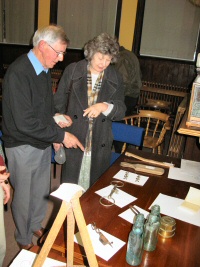 |
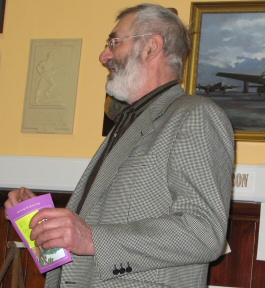 |
| Quiz - Dennis knows the answers! |
Peter gives a mini-talk on "Threshing Days" |
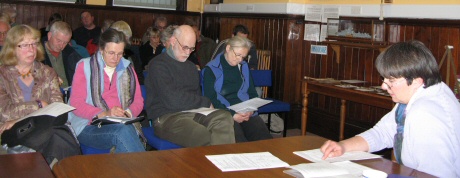 |
Jo administers the AGM and then gives a talk on the use of Wartime Pigeons |
On Monday 21st April 2008, the first AGM of the Pocklington Local History Group took place. After the officers reports, the election of the committee took place.
Chairman – Jo Green
Secretary – Alan Cartwright
Treasurer – Peter Green
Archivist/Webmaster – Andrew Sefton
Committee – Hilary Angle, Phil Gilbank, Dennis Moor, Paul Jennings, David Rumbelow and Pearl Harris. Roger Bellingham is Honorary President. A vote was made to introduce a subscription which was carried. The amount and setting of the future programme would be decided at the next committee meeting.
The evening concluded with three mini-talks by Peter Green on his recollections of threshing days as a youngster, Phil Gilbank gave an illustrated talk on old Cycles in Pocklington, and Jo ended with a talk on the use of pigeons from the Pocklington Airfield in the war.
|
| |
| New Pages Added |
| 20th April 2008 |
|
Earl Morcar may have had his fortified manor in Pocklington. He fought alongside his brother Edwin, against the Viking Invaders at the battle of Fulford in 1066 but was defeated and had to await Harold's army from the south before winning the decisive battle at Stamford Bridge.
More shops have been added. George Todd had a well remembered grocers shop in New Pavement, and Hills Garage in George Street was where Somerfield Supermarket is today.
Pocklington had a Golf Club! it seems to have been located down Yapham road and had over 100 members in it's first year. |
| |
| Pocklington Horse & Foal Show |
| 14th April 2008 |
|
| Latest updates include Pocklington Horse and Foal Show, which was the East Riding's premiere event of it's kind. It started in 1858 and carried on for many years afterwards. Major Percy Stewart was an important Pocklingtonian, he kindly donated in his will to the people of Pocklington, Burnby Hall and it's world famous Water Lily Gardens. Simeon Templeman made his fortune by winning the Derby, read about how it built his house in Burnby.. |
| |
| Everinghams |
| 7th April 2008 |
|
| Everinghams were a family firm who started a tailoring business in Pocklington in the late nineteenth century. They had a factory in the town and sold suits and clothes. With the advent of the motor car, the sons founded a bus company which carried on for many years, and fondly remembered by many in the town. More photos have been added to the story. Let me know if you have more. |
| |
| More Pubs! |
| 4th April 2008 |
|
| The 'White Swan' inn was renamed the 'Merry Legs' inn which was renamed later to the 'Railway Tavern', which then became generally known as the 'Railway Inn' in Railway Street. The story of this public house can be found here. |
| |
| Further Updates |
| 30th March 2008 |
|
All the sporting pages have been updated. Phil Gilbank has written an article on Pocklington Rugby for which he is the definitive authority on the subject. Early Cricket matches and evidence has been found for 250 years of Football in Pockllington in old newspaper references.
Further Pubs have been added to the website. The Feathers has been updated with it's ghost story legend. The Buck Inn later became the Buck hotel with early references and the Three Horseshoes was an old farmers market pub. Two more Pocklington Industry pages on the Pocklington Tannery, and the Flax Fire of 1856 have been added.
Lastly, don't forget the useful LINKS page can be found in the footer of every page on the website. A link for Pocklington Parish Registers can be found there. |
| |

